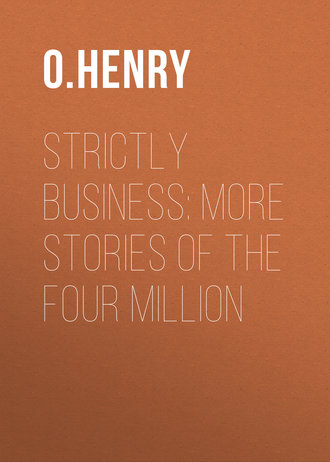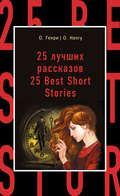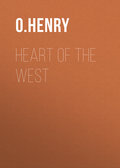
О. Генри
Strictly Business: More Stories of the Four Million
II
THE GOLD THAT GLITTERED
A story with a moral appended is like the bill of a mosquito. It bores you, and then injects a stinging drop to irritate your conscience. Therefore let us have the moral first and be done with it. All is not gold that glitters, but it is a wise child that keeps the stopper in his bottle of testing acid.
Where Broadway skirts the corner of the square presided over by George the Veracious is the Little Rialto. Here stand the actors of that quarter, and this is their shibboleth: "'Nit,' says I to Frohman, 'you can't touch me for a kopeck less than two-fifty per,' and out I walks."
Westward and southward from the Thespian glare are one or two streets where a Spanish-American colony has huddled for a little tropical warmth in the nipping North. The centre of life in this precinct is "El Refugio," a café and restaurant that caters to the volatile exiles from the South. Up from Chili, Bolivia, Colombia, the rolling republics of Central America and the ireful islands of the Western Indies flit the cloaked and sombreroed señores, who are scattered like burning lava by the political eruptions of their several countries. Hither they come to lay counterplots, to bide their time, to solicit funds, to enlist filibusterers, to smuggle out arms and ammunitions, to play the game at long taw. In El Refugio, they find the atmosphere in which they thrive.
In the restaurant of El Refugio are served compounds delightful to the palate of the man from Capricorn or Cancer. Altruism must halt the story thus long. On, diner, weary of the culinary subterfuges of the Gallic chef, hie thee to El Refugio! There only will you find a fish – bluefish, shad or pompano from the Gulf – baked after the Spanish method. Tomatoes give it color, individuality and soul; chili colorado bestows upon it zest, originality and fervor; unknown herbs furnish piquancy and mystery, and – but its crowning glory deserves a new sentence. Around it, above it, beneath it, in its vicinity – but never in it – hovers an ethereal aura, an effluvium so rarefied and delicate that only the Society for Psychical Research could note its origin. Do not say that garlic is in the fish at El Refugio. It is not otherwise than as if the spirit of Garlic, flitting past, has wafted one kiss that lingers in the parsley-crowned dish as haunting as those kisses in life, "by hopeless fancy feigned on lips that are for others." And then, when Conchito, the waiter, brings you a plate of brown frijoles and a carafe of wine that has never stood still between Oporto and El Refugio – ah, Dios!
One day a Hamburg-American liner deposited upon Pier No. 55 Gen. Perrico Ximenes Villablanca Falcon, a passenger from Cartagena. The General was between a claybank and a bay in complexion, had a 42-inch waist and stood 5 feet 4 with his Du Barry heels. He had the mustache of a shooting-gallery proprietor, he wore the full dress of a Texas congressman and had the important aspect of an uninstructed delegate.
Gen. Falcon had enough English under his hat to enable him to inquire his way to the street in which El Refugio stood. When he reached that neighborhood he saw a sign before a respectable red-brick house that read, "Hotel Español." In the window was a card in Spanish, "Aqui se habla Español." The General entered, sure of a congenial port.
In the cozy office was Mrs. O'Brien, the proprietress. She had blond – oh, unimpeachably blond hair. For the rest she was amiability, and ran largely to inches around. Gen. Falcon brushed the floor with his broad-brimmed hat, and emitted a quantity of Spanish, the syllables sounding like firecrackers gently popping their way down the string of a bunch.
"Spanish or Dago?" asked Mrs. O'Brien, pleasantly.
"I am a Colombian, madam," said the General, proudly. "I speak the Spanish. The advisement in your window say the Spanish he is spoken here. How is that?"
"Well, you've been speaking it, ain't you?" said the madam. "I'm sure I can't."
At the Hotel Español General Falcon engaged rooms and established himself. At dusk he sauntered out upon the streets to view the wonders of this roaring city of the North. As he walked he thought of the wonderful golden hair of Mme. O'Brien. "It is here," said the General to himself, no doubt in his own language, "that one shall find the most beautiful señoras in the world. I have not in my Colombia viewed among our beauties one so fair. But no! It is not for the General Falcon to think of beauty. It is my country that claims my devotion."
At the corner of Broadway and the Little Rialto the General became involved. The street cars bewildered him, and the fender of one upset him against a pushcart laden with oranges. A cab driver missed him an inch with a hub, and poured barbarous execrations upon his head. He scrambled to the sidewalk and skipped again in terror when the whistle of a peanut-roaster puffed a hot scream in his ear. "Válgame Dios! What devil's city is this?"
As the General fluttered out of the streamers of passers like a wounded snipe he was marked simultaneously as game by two hunters. One was "Bully" McGuire, whose system of sport required the use of a strong arm and the misuse of an eight-inch piece of lead pipe. The other Nimrod of the asphalt was "Spider" Kelley, a sportsman with more refined methods.
In pouncing upon their self-evident prey, Mr. Kelley was a shade the quicker. His elbow fended accurately the onslaught of Mr. McGuire.
"G'wan!" he commanded harshly. "I saw it first." McGuire slunk away, awed by superior intelligence.
"Pardon me," said Mr. Kelley, to the General, "but you got balled up in the shuffle, didn't you? Let me assist you." He picked up the General's hat and brushed the dust from it.
The ways of Mr. Kelley could not but succeed. The General, bewildered and dismayed by the resounding streets, welcomed his deliverer as a caballero with a most disinterested heart.
"I have a desire," said the General, "to return to the hotel of O'Brien, in which I am stop. Caramba! señor, there is a loudness and rapidness of going and coming in the city of this Nueva York."
Mr. Kelley's politeness would not suffer the distinguished Colombian to brave the dangers of the return unaccompanied. At the door of the Hotel Español they paused. A little lower down on the opposite side of the street shone the modest illuminated sign of El Refugio. Mr. Kelley, to whom few streets were unfamiliar, knew the place exteriorly as a "Dago joint." All foreigners Mr. Kelley classed under the two heads of "Dagoes" and Frenchmen. He proposed to the General that they repair thither and substantiate their acquaintance with a liquid foundation.
An hour later found General Falcon and Mr. Kelley seated at a table in the conspirator's corner of El Refugio. Bottles and glasses were between them. For the tenth time the General confided the secret of his mission to the Estados Unidos. He was here, he declared, to purchase arms – 2,000 stands of Winchester rifles – for the Colombian revolutionists. He had drafts in his pocket drawn by the Cartagena Bank on its New York correspondent for $25,000. At other tables other revolutionists were shouting their political secrets to their fellow-plotters; but none was as loud as the General. He pounded the table; he hallooed for some wine; he roared to his friend that his errand was a secret one, and not to be hinted at to a living soul. Mr. Kelley himself was stirred to sympathetic enthusiasm. He grasped the General's hand across the table.
"Monseer," he said, earnestly, "I don't know where this country of yours is, but I'm for it. I guess it must be a branch of the United States, though, for the poetry guys and the schoolmarms call us Columbia, too, sometimes. It's a lucky thing for you that you butted into me to-night. I'm the only man in New York that can get this gun deal through for you. The Secretary of War of the United States is me best friend. He's in the city now, and I'll see him for you to-morrow. In the meantime, monseer, you keep them drafts tight in your inside pocket. I'll call for you to-morrow, and take you to see him. Say! that ain't the District of Columbia you're talking about, is it?" concluded Mr. Kelley, with a sudden qualm. "You can't capture that with no 2,000 guns – it's been tried with more."
"No, no, no!" exclaimed the General. "It is the Republic of Colombia – it is a g-r-reat republic on the top side of America of the South. Yes. Yes."
"All right," said Mr. Kelley, reassured. "Now suppose we trek along home and go by-by. I'll write to the Secretary to-night and make a date with him. It's a ticklish job to get guns out of New York. McClusky himself can't do it."
They parted at the door of the Hotel Español. The General rolled his eyes at the moon and sighed.
"It is a great country, your Nueva York," he said. "Truly the cars in the streets devastate one, and the engine that cooks the nuts terribly makes a squeak in the ear. But, ah, Señor Kelley – the señoras with hair of much goldness, and admirable fatness – they are magnificas! Muy magnificas!"
Kelley went to the nearest telephone booth and called up McCrary's café, far up on Broadway. He asked for Jimmy Dunn.
"Is that Jimmy Dunn?" asked Kelley.
"Yes," came the answer.
"You're a liar," sang back Kelley, joyfully. "You're the Secretary of War. Wait there till I come up. I've got the finest thing down here in the way of a fish you ever baited for. It's a Colorado-maduro, with a gold band around it and free coupons enough to buy a red hall lamp and a statuette of Psyche rubbering in the brook. I'll be up on the next car."
Jimmy Dunn was an A. M. of Crookdom. He was an artist in the confidence line. He never saw a bludgeon in his life; and he scorned knockout drops. In fact, he would have set nothing before an intended victim but the purest of drinks, if it had been possible to procure such a thing in New York. It was the ambition of "Spider" Kelley to elevate himself into Jimmy's class.
These two gentlemen held a conference that night at McCrary's. Kelley explained.
"He's as easy as a gumshoe. He's from the Island of Colombia, where there's a strike, or a feud, or something going on, and they've sent him up here to buy 2,000 Winchesters to arbitrate the thing with. He showed me two drafts for $10,000 each, and one for $5,000 on a bank here. 'S truth, Jimmy, I felt real mad with him because he didn't have it in thousand-dollar bills, and hand it to me on a silver waiter. Now, we've got to wait till he goes to the bank and gets the money for us."
They talked it over for two hours, and then Dunn said; "Bring him to No. – Broadway, at four o'clock to-morrow afternoon."
In due time Kelley called at the Hotel Español for the General. He found the wily warrior engaged in delectable conversation with Mrs. O'Brien.
"The Secretary of War is waitin' for us," said Kelley.
The General tore himself away with an effort.
"Ay, señor," he said, with a sigh, "duty makes a call. But, señor, the señoras of your Estados Unidos – how beauties! For exemplification, take you la Madame O'Brien – que magnifica! She is one goddess – one Juno – what you call one ox-eyed Juno."
Now Mr. Kelley was a wit; and better men have been shriveled by the fire of their own imagination.
"Sure!" he said with a grin; "but you mean a peroxide Juno, don't you?"
Mrs. O'Brien heard, and lifted an auriferous head. Her businesslike eye rested for an instant upon the disappearing form of Mr. Kelley. Except in street cars one should never be unnecessarily rude to a lady.
When the gallant Colombian and his escort arrived at the Broadway address, they were held in an anteroom for half an hour, and then admitted into a well-equipped office where a distinguished looking man, with a smooth face, wrote at a desk. General Falcon was presented to the Secretary of War of the United States, and his mission made known by his old friend, Mr. Kelley.
"Ah – Colombia!" said the Secretary, significantly, when he was made to understand; "I'm afraid there will be a little difficulty in that case. The President and I differ in our sympathies there. He prefers the established government, while I – " the secretary gave the General a mysterious but encouraging smile. "You, of course, know, General Falcon, that since the Tammany war, an act of Congress has been passed requiring all manufactured arms and ammunition exported from this country to pass through the War Department. Now, if I can do anything for you I will be glad to do so to oblige my old friend, Mr. Kelley. But it must be in absolute secrecy, as the President, as I have said, does not regard favorably the efforts of your revolutionary party in Colombia. I will have my orderly bring a list of the available arms now in the warehouse."
The Secretary struck a bell, and an orderly with the letters A. D. T. on his cap stepped promptly into the room.
"Bring me Schedule B of the small arms inventory," said the Secretary.
The orderly quickly returned with a printed paper. The Secretary studied it closely.
"I find," he said, "that in Warehouse 9, of Government stores, there is shipment of 2,000 stands of Winchester rifles that were ordered by the Sultan of Morocco, who forgot to send the cash with his order. Our rule is that legal-tender money must be paid down at the time of purchase. My dear Kelley, your friend, General Falcon, shall have this lot of arms, if he desires it, at the manufacturer's price. And you will forgive me, I am sure, if I curtail our interview. I am expecting the Japanese Minister and Charles Murphy every moment!"
As one result of this interview, the General was deeply grateful to his esteemed friend, Mr. Kelley. As another, the nimble Secretary of War was extremely busy during the next two days buying empty rifle cases and filling them with bricks, which were then stored in a warehouse rented for that purpose. As still another, when the General returned to the Hotel Español, Mrs. O'Brien went up to him, plucked a thread from his lapel, and said:
"Say, señor, I don't want to 'butt in,' but what does that monkey-faced, cat-eyed, rubber-necked tin horn tough want with you?"
"Sangre de mi vida!" exclaimed the General. "Impossible it is that you speak of my good friend, Señor Kelley."
"Come into the summer garden," said Mrs. O'Brien. "I want to have a talk with you."
Let us suppose that an hour has elapsed.
"And you say," said the General, "that for the sum of $18,000 can be purchased the furnishment of the house and the lease of one year with this garden so lovely – so resembling unto the patios of my cara Colombia?"
"And dirt cheap at that," sighed the lady.
"Ah, Dios!" breathed General Falcon. "What to me is war and politics? This spot is one paradise. My country it have other brave heroes to continue the fighting. What to me should be glory and the shooting of mans? Ah! no. It is here I have found one angel. Let us buy the Hotel Español and you shall be mine, and the money shall not be waste on guns."
Mrs. O'Brien rested her blond pompadour against the shoulder of the Colombian patriot.
"Oh, señor," she sighed, happily, "ain't you terrible!"
Two days later was the time appointed for the delivery of the arms to the General. The boxes of supposed rifles were stacked in the rented warehouse, and the Secretary of War sat upon them, waiting for his friend Kelley to fetch the victim.
Mr. Kelley hurried, at the hour, to the Hotel Español. He found the General behind the desk adding up accounts.
"I have decide," said the General, "to buy not guns. I have to-day buy the insides of this hotel, and there shall be marrying of the General Perrico Ximenes Villablanca Falcon with la Madame O'Brien."
Mr. Kelley almost strangled.
"Say, you old bald-headed bottle of shoe polish," he spluttered, "you're a swindler – that's what you are! You've bought a boarding house with money belonging to your infernal country, wherever it is."
"Ah," said the General, footing up a column, "that is what you call politics. War and revolution they are not nice. Yes. It is not best that one shall always follow Minerva. No. It is of quite desirable to keep hotels and be with that Juno – that ox-eyed Juno. Ah! what hair of the gold it is that she have!"
Mr. Kelley choked again.
"Ah, Senor Kelley!" said the General, feelingly and finally, "is it that you have never eaten of the corned beef hash that Madame O'Brien she make?"
III
BABES IN THE JUNGLE
Montague Silver, the finest street man and art grafter in the West, says to me once in Little Rock: "If you ever lose your mind, Billy, and get too old to do honest swindling among grown men, go to New York. In the West a sucker is born every minute; but in New York they appear in chunks of roe – you can't count 'em!"
Two years afterward I found that I couldn't remember the names of the Russian admirals, and I noticed some gray hairs over my left ear; so I knew the time had arrived for me to take Silver's advice.
I struck New York about noon one day, and took a walk up Broadway. And I run against Silver himself, all encompassed up in a spacious kind of haberdashery, leaning against a hotel and rubbing the half-moons on his nails with a silk handkerchief.
"Paresis or superannuated?" I asks him.
"Hello, Billy," says Silver; "I'm glad to see you. Yes, it seemed to me that the West was accumulating a little too much wiseness. I've been saving New York for dessert. I know it's a low-down trick to take things from these people. They only know this and that and pass to and fro and think ever and anon. I'd hate for my mother to know I was skinning these weak-minded ones. She raised me better."
"Is there a crush already in the waiting rooms of the old doctor that does skin grafting?" I asks.
"Well, no," says Silver; "you needn't back Epidermis to win to-day. I've only been here a month. But I'm ready to begin; and the members of Willie Manhattan's Sunday School class, each of whom has volunteered to contribute a portion of cuticle toward this rehabilitation, may as well send their photos to the Evening Daily.
"I've been studying the town," says Silver, "and reading the papers every day, and I know it as well as the cat in the City Hall knows an O'Sullivan. People here lie down on the floor and scream and kick when you are the least bit slow about taking money from them. Come up in my room and I'll tell you. We'll work the town together, Billy, for the sake of old times."
Silver takes me up in a hotel. He has a quantity of irrelevant objects lying about.
"There's more ways of getting money from these metropolitan hayseeds," says Silver, "than there is of cooking rice in Charleston, S. C. They'll bite at anything. The brains of most of 'em commute. The wiser they are in intelligence the less perception of cognizance they have. Why, didn't a man the other day sell J. P. Morgan an oil portrait of Rockefeller, Jr., for Andrea del Sarto's celebrated painting of the young Saint John!
"You see that bundle of printed stuff in the corner, Billy? That's gold mining stock. I started out one day to sell that, but I quit it in two hours. Why? Got arrested for blocking the street. People fought to buy it. I sold the policeman a block of it on the way to the station-house, and then I took it off the market. I don't want people to give me their money. I want some little consideration connected with the transaction to keep my pride from being hurt. I want 'em to guess the missing letter in Chic – go, or draw to a pair of nines before they pay me a cent of money.
"Now there's another little scheme that worked so easy I had to quit it. You see that bottle of blue ink on the table? I tattooed an anchor on the back of my hand and went to a bank and told 'em I was Admiral Dewey's nephew. They offered to cash my draft on him for a thousand, but I didn't know my uncle's first name. It shows, though, what an easy town it is. As for burglars, they won't go in a house now unless there's a hot supper ready and a few college students to wait on 'em. They're slugging citizens all over the upper part of the city and I guess, taking the town from end to end, it's a plain case of assault and Battery."
"Monty," says I, when Silver had slacked, up, "you may have Manhattan correctly discriminated in your perorative, but I doubt it. I've only been in town two hours, but it don't dawn upon me that it's ours with a cherry in it. There ain't enough rus in urbe about it to suit me. I'd be a good deal much better satisfied if the citizens had a straw or more in their hair, and run more to velveteen vests and buckeye watch charms. They don't look easy to me."
"You've got it, Billy," says Silver. "All emigrants have it. New York's bigger than Little Rock or Europe, and it frightens a foreigner. You'll be all right. I tell you I feel like slapping the people here because they don't send me all their money in laundry baskets, with germicide sprinkled over it. I hate to go down on the street to get it. Who wears the diamonds in this town? Why, Winnie, the Wiretapper's wife, and Bella, the Buncosteerer's bride. New Yorkers can be worked easier than a blue rose on a tidy. The only thing that bothers me is I know I'll break the cigars in my vest pocket when I get my clothes all full of twenties."
"I hope you are right, Monty," says I; "but I wish all the same I had been satisfied with a small business in Little Rock. The crop of farmers is never so short out there but what you can get a few of 'em to sign a petition for a new post office that you can discount for $200 at the county bank. The people here appear to possess instincts of self-preservation and illiberality. I fear me that we are not cultured enough to tackle this game."
"Don't worry," says Silver. "I've got this Jayville-near-Tarrytown correctly estimated as sure as North River is the Hudson and East River ain't a river. Why, there are people living in four blocks of Broadway who never saw any kind of a building except a skyscraper in their lives! A good, live hustling Western man ought to get conspicuous enough here inside of three months to incur either Jerome's clemency or Lawson's displeasure."
"Hyperbole aside," says I, "do you know of any immediate system of buncoing the community out of a dollar or two except by applying to the Salvation Army or having a fit on Miss Helen Gould's doorsteps?"
"Dozens of 'em," says Silver. "How much capital have you got, Billy?"
"A thousand," I told him.
"I've got $1,200," says he. "We'll pool and do a big piece of business. There's so many ways we can make a million that I don't know how to begin."
The next morning Silver meets me at the hotel and he is all sonorous and stirred with a kind of silent joy.
"We're to meet J. P. Morgan this afternoon," says he. "A man I know in the hotel wants to introduce us. He's a friend of his. He says he likes to meet people from the West."
"That sounds nice and plausible," says I. "I'd like to know Mr. Morgan."
"It won't hurt us a bit," says Silver, "to get acquainted with a few finance kings. I kind of like the social way New York has with strangers."
The man Silver knew was named Klein. At three o'clock Klein brought his Wall Street friend to see us in Silver's room. "Mr. Morgan" looked some like his pictures, and he had a Turkish towel wrapped around his left foot, and he walked with a cane.
"Mr. Silver and Mr. Pescud," says Klein. "It sounds superfluous," says he, "to mention the name of the greatest financial – "
"Cut it out, Klein," says Mr. Morgan. "I'm glad to know you gents; I take great interest in the West. Klein tells me you're from Little Rock. I think I've a railroad or two out there somewhere. If either of you guys would like to deal a hand or two of stud poker I – "
"Now, Pierpont," cuts in Klein, "you forget!"
"Excuse me, gents!" says Morgan; "since I've had the gout so bad I sometimes play a social game of cards at my house. Neither of you never knew One-eyed Peters, did you, while you was around Little Rock? He lived in Seattle, New Mexico."
Before we could answer, Mr. Morgan hammers on the floor with his cane and begins to walk up and down, swearing in a loud tone of voice.
"They have been pounding your stocks to-day on the Street, Pierpont?" asks Klein, smiling.
"Stocks! No!" roars Mr. Morgan. "It's that picture I sent an agent to Europe to buy. I just thought about it. He cabled me to-day that it ain't to be found in all Italy. I'd pay $50,000 to-morrow for that picture – yes, $75,000. I give the agent a la carte in purchasing it. I cannot understand why the art galleries will allow a De Vinchy to – "
"Why, Mr. Morgan," says klein; "I thought you owned all of the De Vinchy paintings."
"What is the picture like, Mr. Morgan?" asks Silver. "It must be as big as the side of the Flatiron Building."
"I'm afraid your art education is on the bum, Mr. Silver," says Morgan. "The picture is 27 inches by 42; and it is called 'Love's Idle Hour.' It represents a number of cloak models doing the two-step on the bank of a purple river. The cablegram said it might have been brought to this country. My collection will never be complete without that picture. Well, so long, gents; us financiers must keep early hours."
Mr. Morgan and Klein went away together in a cab. Me and Silver talked about how simple and unsuspecting great people was; and Silver said what a shame it would be to try to rob a man like Mr. Morgan; and I said I thought it would be rather imprudent, myself. Klein proposes a stroll after dinner; and me and him and Silver walks down toward Seventh Avenue to see the sights. Klein sees a pair of cuff links that instigate his admiration in a pawnshop window, and we all go in while he buys 'em.
After we got back to the hotel and Klein had gone, Silver jumps at me and waves his hands.
"Did you see it?" says he. "Did you see it, Billy?"
"What?" I asks.
"Why, that picture that Morgan wants. It's hanging in that pawnshop, behind the desk. I didn't say anything because Klein was there. It's the article sure as you live. The girls are as natural as paint can make them, all measuring 36 and 25 and 42 skirts, if they had any skirts, and they're doing a buck-and-wing on the bank of a river with the blues. What did Mr. Morgan say he'd give for it? Oh, don't make me tell you. They can't know what it is in that pawnshop."
When the pawnshop opened the next morning me and Silver was standing there as anxious as if we wanted to soak our Sunday suit to buy a drink. We sauntered inside, and began to look at watch-chains.
"That's a violent specimen of a chromo you've got up there," remarked Silver, casual, to the pawnbroker. "But I kind of enthuse over the girl with the shoulder-blades and red bunting. Would an offer of $2.25 for it cause you to knock over any fragile articles of your stock in hurrying it off the nail?"
The pawnbroker smiles and goes on showing us plate watch-chains.
"That picture," says he, "was pledged a year ago by an Italian gentleman. I loaned him $500 on it. It is called 'Love's Idle Hour,' and it is by Leonardo de Vinchy. Two days ago the legal time expired, and it became an unredeemed pledge. Here is a style of chain that is worn a great deal now."
At the end of half an hour me and Silver paid the pawnbroker $2,000 and walked out with the picture. Silver got into a cab with it and started for Morgan's office. I goes to the hotel and waits for him. In two hours Silver comes back.
"Did you see Mr. Morgan?" I asks. "How much did he pay you for it?"
Silver sits down and fools with a tassel on the table cover.
"I never exactly saw Mr. Morgan," he says, "because Mr. Morgan's been in Europe for a month. But what's worrying me, Billy, is this: The department stores have all got that same picture on sale, framed, for $3.48. And they charge $3.50 for the frame alone – that's what I can't understand."







